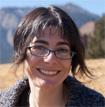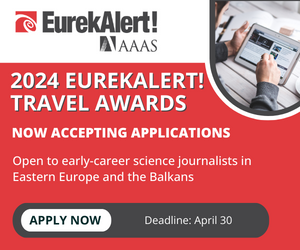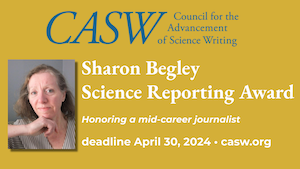I found out about science writing in an unlikely place: the hot and sweaty West African nation of Guinea. I was working as a Peace Corps volunteer, and one day happened to meet a successful writer for Science magazine who was visiting her boyfriend, another volunteer. Her enthusiasm for science writing got me hooked on the idea of using my creative side to express and explore my love of the natural world. Twelve years later, I'm a writer who specializes in science education, as well as a physicist. I'm one of the relatively few writers who gritted her teeth through the whole game of doctor, working on my PhD while squeezing in writing experience on the side. Here is my story: what I did, and how it worked for me.
The Science Gristmill — Dr. Steph
Like many other science writers, I found that I loved learning about science more than actually doing it. So once my classes were done and I began the research for my PhD, my enthusiasm for the degree began to wane. I began to wonder if I should change my career track. I read books and attended NASW conferences to learn more about science writing, and I posed the question to many writers: "Should I finish the degree?" I was told that in some venues (such as newspapers) the doctorate might count against me, since I would be numbered among the lost souls who could no longer communicate with regular people. But for the most part, people looked slightly wistful. "Finish it," they told me. "It will open doors."
I wasn't entirely convinced, and I applied to the science writing program at my university — the University of California-Santa Cruz — then run by John Wilkes. John liked me and my work, but he claimed he wasn't sure that I would leave my PhD program if he were to accept me.
It was clear that if I wanted to learn to communicate science, I would have to put together my own learning program. A friendly phooey on John; I would show him!
Do-it-Yourself Science Writing
I continued to suffer through my PhD research, while also launching my science journalism quest.
I knew I needed some directed training in writing, so I enrolled in a journalism class at Santa Cruz. I recommend this highly to anyone. I learned the essential features of a story and got hands-on editing practice. I also wanted clips, and the instructor was well-connected with the local paper. She managed to get two of my pieces for the class (written on my own research area of solar energy) published in the Santa Cruz Sentinel. After the class ended, I continued to write for the Sentinel, for peanuts, to get those precious clips and more experience.
I also kept in contact with the Santa Cruz science writing program, and traveled with their students to conferences. By making myself visible in this way, I developed valuable contacts and connections. When the Stanford News Service didn't fill their internship that semester, I heard about it from these contacts, and offered to write some pieces for the service. "Write for free" is the first piece of advice I give to others (look up "reciprocity (social psychology)" on Wikipedia). I got valuable editing and assistance from the people to whom I donated my reporting and writing time. Plus, one of my press releases for Stanford garnered the attention of a writer for National Geographic, leading to my first writing gig in a (different) national magazine.
The Best Job I'll Never Have
But I had a higher plan. When talking to other science writers at conferences, I'd been told that the two best routes for a scientist like me were to go through the Santa Cruz program (oh, well), or to get a fellowship with the AAAS Mass Media Science & Engineering Fellows program. So I gathered enough clips to create a good portfolio, and was accepted as a fellow. "Where would you like to be placed?" the fellowship staff asked. I hadn't really thought about it. "NPR would be cool," I suggested. My luck was golden; no one else had asked for the National Public Radio assignment. So I was off to the science desk at NPR, in Washington, D.C.
At NPR, I learned the high standards of excellence of national science reporting, including the nuances of language, the delicacies of health study implications, the dirty job of digging stories out of press releases and conferences, and how to write short, short, SHORT. I developed a deep respect for the science reporters and their craft, and discovered a latent love for audio. NPR correspondent Susan Stamberg said I had a "good radio voice." I was in heaven.
Helen Fields, another former NPR intern, once told me wistfully, "I want my internship back!" And so do I. I would do it again in a heartbeat.
NPR was a delightful tease — a wonderful internship experience, but a job I'm unlikely to land permanently. Hence, "the best job I'll never have." But that internship gave me so much. Not only did I gain great experience at NPR, but the name carries a lot of clout. Even people who don't know the AAAS mass media fellowship know the name "NPR." So, it's certainly helpful if you can snag an internship at a nationally recognized venue; the NASW internship fairs can help with that quest. And, another theme song from this experience is, it doesn't hurt to ask.
What About That Pesky PhD?
Right about now you might be wondering how I managed to do all this and work on my PhD. I was very fortunate to have an extremely supportive advisor during my degree work. She granted me time off in the summer to do the AAAS fellowship, and when a contact arranged for me to take a researcher position with Twin Cities Public Television, she supported that as well. Other PhD students aren't so lucky; their advisors keep them under lock and key. But, many PhD students are also too shy to ask, and remember, it doesn't hurt to ask. Workaholic tendencies come in handy, too.
Selling Myself
In the last years of my PhD, I became my own business. I continued to teach myself about science writing and communication, and I marketed myself. Networking always feels slimy when you're doing it as a means to an end, so I approach it with a sense of genuine curiosity and interest in people. Here are some of the surprising ways that my passionate delving into science communication has led to personal connections and jobs:
- I volunteered to give a presentation at a science book club, which led to an introduction to physicist/writer Michael Riordan. He got me the researcher position at Twin Cities Public Television.
- I offered to edit the physics laboratory manuals at Santa Cruz in lieu of a teaching assistantship, gaining valuable writing experience.
- I audited an environmental writing course, befriending the instructor, Sarah Rabkin. She gave me professional advice and invited me back several times to present to her class on my career.
- Overhearing a writer trying to explain dark matter in the 30 seconds before a NASW talk, I introduced myself as a fellow physicist. I have now written for David Ehrenstein (Physical Review Focus) a few times, and he is a friendly professional contact.
- I wrote several press releases, for free, for the Stanford Report. One garnered the attention of the editor of a national magazine. He asked me to write a feature article on the topic, and I continued to contribute to that publication.
- I contacted the husband of a family friend to find out more about science writing (these "informational interviews" are fantastic ways to find out about a field and get connections). I subsequently wrote a piece for the science career website he edited.
- At the suggestion of my advisor, I contacted a scientist who was starting an ambitious public outreach project. He hired me as project manager, and through that job I met museum directors from around the country, science education specialists, and a national grantwriter. I still call on many of those contacts, and that is where I was introduced to the central figures at the Exploratorium museum in San Francisco.
The Exploratorium (The Other Best Job I'll Never Have)
Soon after receiving my PhD, I heard that the Exploratorium was seeking a PhD physicist for a National Science Foundation-funded postdoctoral position running teacher workshops. I got the job and accepted enthusiastically, even though it represented a definitive career shift away from traditional science journalism and toward science education. While at the Exploratorium, however, I continued to write. In particular, I convinced the museum to give me a crack at creating their first regular podcast series, for their nanotechnology program. Through this and another podcast series, I learned the art of podcast production, and I have now produced podcasts as a freelancer, including a series for elementary teachers for the National Science Digital Library, and interview segments for Science magazine.
While I do a small amount of traditional science journalism, today my main career is devoted to improving science education and supporting teacher professional development. I create videos and write papers on effective pedagogy, blog for science teachers, produce podcasts to communicate polar science to elementary teachers, design professional development curricula, and evaluate the effectiveness of educational programs. For me, writing is one of the tools I carry in my kit toward creating effective education programs.
Lessons Learned
I've been continually inspired by the simple fact that science writers are really nice people. I have asked for advice and assistance from many talented and intelligent writers, and they have given it freely, for the most part. While some writers have ignored my contact or questions, they are rare.
It's worked for me to be self-promoting without being pushy. I keep attractive business cards in my back pocket and distribute them freely. I give a little to get a little — I cultivate a genuine curiosity in what other people are doing, and ask questions to show it, but also have an elevator speech ready about myself — a verbal resume. I have found ways to do this that work with my innate shyness and introversion, though it's always a continuing process.
Almost everything interesting that's happened in my career was the result of me asking someone for something, such as an exception to the rules or the chance to do something new. On the other hand, it's important to realize that rules are there for a reason, and there is a time to go with the flow. Being flexible and accommodating gains you valuable goodwill. There are times when I wish I'd recognized this line more clearly.
Lastly, writing takes practice. My blog gives me a public platform that helps me market myself, but it also gets me to write something every week. I also got writing practice by writing for free, creating podcasts, and writing as much as I could within jobs that were not focused on writing.
For the record, in the end I have mixed feelings about having completed the doctorate. It did open doors, and I am able to work on higher-level projects than I ever would have if I had left with a master's. My professional life is now rich and varied, and I have a lot of control over my work. On the other hand, I spent three miserable years in the lab and, because I didn't enjoy the process, I did not soak up many of the skills in problem-solving and research that are the mark of a PhD. I have a valuable piece of paper, but it's as much a symbol of my stubborn nature and innate intelligence as it is a symbol of a doctorate-level understanding and aptitude. If this is a decision that you are trying to make for yourself, there is no easy answer as to the right path.
I'll close with a story that defines my rather indirect professional path. I tell this to all people who ask me about my career, which defines the word "alternative." "I'm like bacteria," I tell them. Bacteria — thermophilic or acidophilic bacteria, for example — do not "know" that the hot spot or acidic island is "over there." They have no overall map of their surroundings to direct their movement in a straight line towards what they seek. What they sense instead is a local gradient — a small change, right next to them. It's a little warmer that way. They move slightly. They feel it out again. Move. Feel. Move. And feel. The resulting path is a somewhat jagged, but non-random, path toward the thing that they love. And so is mine. I could not have predicted, on that hot, bright day in Guinea, that I would end up writing for science teachers. But I listened to a woman talk about science communication and something perked up inside me. That way, it's a little warmer that way. And I took a step.
Stephanie Chasteen is a science education and communication consultant, and a part-time science teaching fellow at the University of Colorado at Boulder. As a freelance writer, she has written for a variety of local and national print and web publications, interned at National Public Radio's science desk, and created several published podcast series. She holds a PhD in condensed matter physics from the University of California at Santa Cruz. Previously a postdoctoral fellow at the Exploratorium Museum of Science, Art, and Human Perception in San Francisco, she is interested in engaging the public in scientific inquiry and creating effective teacher professional development programs. Her website and blog are at sciencegeekgirl.com.

.png)

